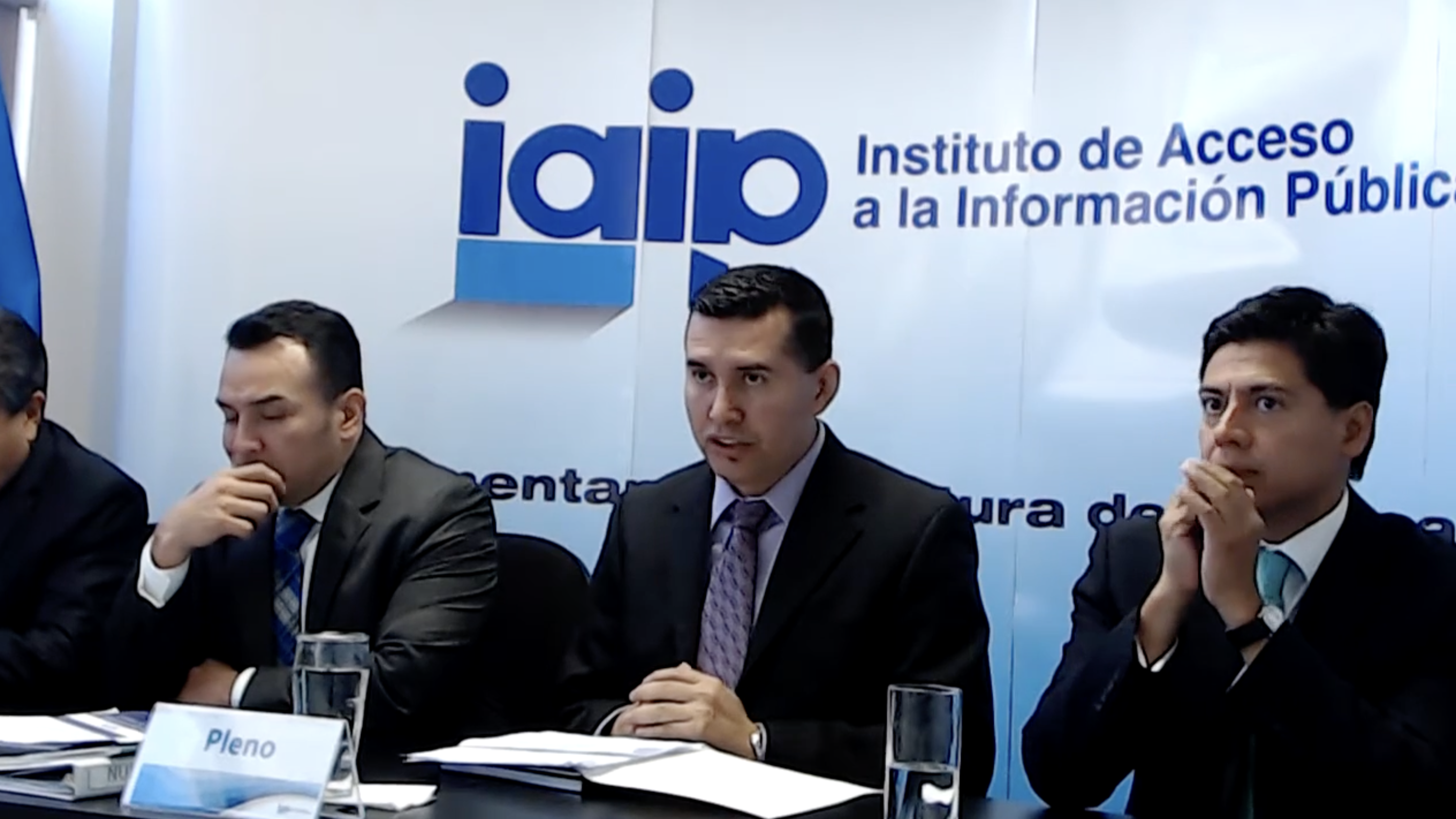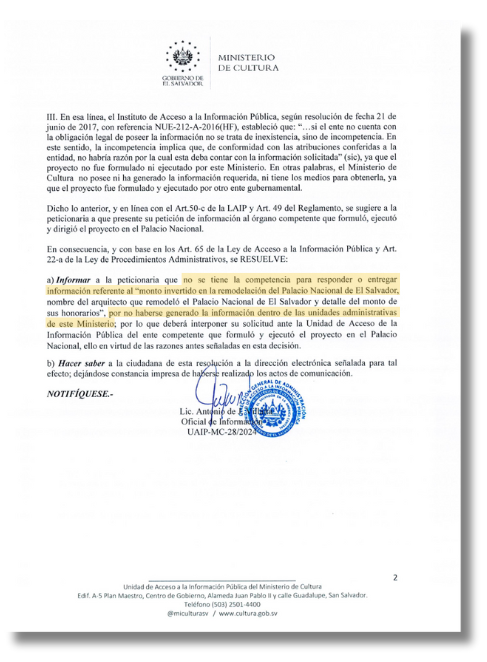In her more than 13-year career as an investigative journalist, Loida Martínez Avelar has witnessed the decline of transparency in her native El Salvador. She recalls how news reporting that relied on the Law on Access to Public Information, or LAIP for its initials in Spanish, brought social problems and corruption cases to light.
She specifically remembers a major report on early motherhood published in 2018 by the outlet where she works, Revista Factum, which was representative of the reach Salvadoran journalism achieved with relying on the transparency system.
“We created a map of teenage pregnancies. We proved that 30 percent of pregnancies in El Salvador were minors,” Martínez Avelar told LatAm Journalism Review (LJR). “That work was done with access to public information, using requested statistics. That kind of basic information is something the Ministry of Health no longer gives you.”

Journalists consider that the Institute of Access to Public Information of El Salvador has become “just another accessory of the state apparatus.” (Photo: Screenshot from YouTube)
Since President Nayib Bukele took office in 2019, the regression has become more noticeable, Martínez Avelar said. She said that in September 2020, she requested information about an agreement the government made for Spanish doctors to travel to El Salvador to provide services during the COVID-19 pandemic.
Not only was her request denied, but she received a response only last year, four years later, despite the LAIP requiring requests for information to be answered within 10 business days, extendable to 15.
“I see all the setbacks the Law on Access to Public Information has suffered,” Martínez Avelar said. “The institute responsible for ensuring compliance with this law has become just another accessory in the state apparatus. It’s not doing its job.”
This is not just one journalist’s perception. A report by the independent Acción Ciudadana, published in March last year, revealed a low rate of requests resolved by the Institute for Access to Public Information, or IAIP for its initials in Spanish, and a clear decrease in decisions favoring citizens in 2023.
Faced with this decline in the right to access information—manifested primarily through an inoperative oversight body and increased government data restrictions—Martínez Avelar and other Salvadoran journalists have been forced to find alternatives to continue uncovering information that holds those in power accountable.
Among the tactics the press is using to circumvent restrictions on public information are relying on anonymous sources, collaborating with civil society organizations, following up on citizen complaints and building their own databases.
“Obtaining information that allows for accountability and citizen oversight is almost impossible,” investigative journalist Karen Moreno of Revista Factum told LJR. “The challenge for journalists in this scenario is to find and cultivate sources of information that can provide leads or documents of public interest.”
Moreno, who used public information requests to investigate the wealth of legislators from previous terms and monitor violence against women in El Salvador, said another challenge journalists face is sharpening their "journalistic instinct" to identify leads in the information that is still available.
However, Moreno acknowledges that seeking alternative sources is not so easy because of the fear instilled in citizens following the state of emergency declared by Bukele in March 2022. This measure, implemented in response to an alarming increase in violence in the country, has been criticized by international organizations for allegedly being used as a tool to suppress critical voices and facilitate human rights violations.
For her part, Martínez Avelar said journalists have also been forced to build their own databases with information they manage to collect through leaks or from organizations that document corruption or human rights violations, which they then verify.
“We are building our own databases with interviews, verified data and the collaboration of civil society organizations, which are doing great work,” Martínez Avelar said. “There will always be sources out there observing reality and providing us with proof.”
Citizen complaints on social media have also become an important source of information, Martínez Avelar said. At Revista Factum’s newsroom, she added, more and more investigative reports are beginning with a citizen complaint that is then subjected to verification and cross-checking with other sources.
In a comparative analysis of public information access laws in four Central American countries, published by Article 19 in 2023, El Salvador’s LAIP stood out as a relatively acceptable legal framework.

In September 2020, President Bukele appointed new IAIP commissioners in a process that was described as irregular and not very transparent. (Photo: YouTube screenshot)
According to the analysis, Salvadoran legislation is distinguished by its comprehensive approach and a stronger legal framework compared to the laws in Guatemala, Honduras and Nicaragua. The LAIP incorporates principles that promote transparency and accountability, making it easier for citizens to access information about public administration.
While Article 19’s analysis also found areas for improvement, the right to access information in El Salvador had been functioning relatively well, according to Eduardo Escobar, executive director of Acción Ciudadana, an independent organization that works in favor of transparency and accountability.
“What allowed presidents or officials from both the [political party Nationalist Republican Alliance] ARENA and the FMLN [Farabundo Martí National Liberation Front] to be prosecuted for corruption problems was precisely access to information,” Escobar told LJR. “Through information requests, certain irregularities were detected that, when followed, revealed corruption.”
For this reason, he added, when Bukele came to power, he knew he could not allow as broad and unrestricted access to information as previous governments had, as it would risk exposing irregularities in his administration.
“From the first day they took control of the executive branch, they began restricting access to information, classifying data as reserved and doing everything they’ve been doing,” Escobar said.
In September 2020, Bukele approved changes to the LAIP regulations that reduced the autonomy of commissioners. That same month, the president appointed new commissioners in a process criticized as irregular and nontransparent for allegedly being conducted through a secret vote.
“Since 2020, when the commissioners began to be replaced, the institute’s work has significantly declined. It has stopped monitoring access to information as it should,” Escobar said. “It has stopped resolving cases, and when it does, it favors the government’s interests over those of citizens. It has abandoned its role of protecting the right to access information.”
This applies to virtually all public information offices in government agencies, where journalists previously had access to public data, Moreno added.
“They have become 'gatekeepers' of information, controlling public data and deciding what and how much to publish,” she said.
This control of information aims primarily to control the narrative around Bukele’s administration, Escobar said. This becomes evident in the lack of access to public information to verify the supposed achievements the president and his officials often exaggerate, such as claiming El Salvador is the safest country in the Western Hemisphere or that it managed the pandemic better than any other nation worldwide.
“They can say whatever they want, and there’s no way to fact-check it. Classifying information is a means of social control. They control what citizens think and say about public administration,” Escobar said. “The bedrock of their governance is being able to present or inflate data or situations. To maintain their propaganda, they need to control the narrative, and that means controlling access to information so no one can challenge their figures.”
Other indicators of the deterioration of transparency in El Salvador are the indices of classified information, referring to logs of public information that by law is classified.
Article 19 of El Salvador’s LAIP establishes the grounds on which public information can be categorized as classified, including national security, the integrity of individuals, and ongoing judicial processes.

Public institutions often deny the requested information with excuses such as that the information does not exist or has not been generated. (Photo: Courtesy of Loida Martínez Avelar)
“They have abused that article and included a great deal of public interest information in those classified information indices,” Martínez Avelar said. “There have been cases where journalists submitted specific information requests, and they read them and then added the requested information to the index.”
According to a report published in 2023 by the University Observatory on Human Rights, or OUDH for its initials in Spanish, there has been a growing pattern of public institutions in El Salvador using classified information labels since 2019, particularly for topics related to security and human rights.
This trend has worsened since the state of exception came into effect. Since March 2020, the government has declared a large portion of information related to security policies as confidential, citing “national security” reasons.
“The time required for investigative journalism has lengthened because, with public information being classified, it’s harder to verify leads,” said Moreno. “Data on homicides, disappearances, femicides, and other violence against women, for example, are now classified as secret. We can no longer verify public security policies.”
Although LAIP says citizens have the right to appeal decisions regarding their information access requests, appeals rarely succeed. According to the Acción Ciudadana report, of the 131 appeals and unresolved cases addressed by the IAIP in 2023, only 10 were resolved in favor of citizens, representing less than 8%.
Both Martínez Avelar and Moreno attribute the low success rate of appeals to the lack of true independence within the IAIP, which they say is led by commissioners aligned with Bukele’s government. Previously, if appeals to the institute failed, citizens had the option of filing a constitutional claim with the Constitutional Chamber of the Supreme Court of Justice. However, this chamber is another institution that has fallen under the executive’s control, said Escobar.
“It was a key factor [for Bukele’s administration] to take control of the Constitutional Chamber,” Escobar said. “What they did upon gaining a legislative majority in 2021 was to remove the magistrates and appoint employees from the Presidential Office as new magistrates.”
The apparent co-opting of El Salvador’s justice institutions means journalists often give up from the outset on pursuing legal avenues to assert their right to access public information.
“The lawsuits are quite exhausting,” Martínez Avelar said. “We’re already very busy trying to find other ways to obtain information.”